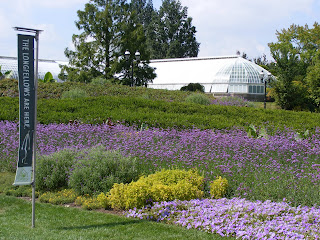

Friday morning, the spouses of the G-20 leaders and other international organizations toured the Creative and Performing Arts School before taking in a series of performances.
The students and faculty at CAPA had been preparing for the event for months. When she spoke to a room of about two hundred students First Lady Michelle Obama said she had been looking forward to the event the entire week.
The first lady and twenty other spouses spent about twenty minutes visiting classrooms where students were simulating what a typical schoolday is like. The school offers different majors – visual and literary arts, theater, instrumental and vocal music and dance. Mrs. Obama visited a ballet studio and the orchestra room.
They then posed for a “family photo” in the schools Cabaret Room for members of the media. The women laughed and joked amongst themselves as cameras clicked frantically.
In the school’s auditorium, students sat on the main floor while the spouses sat in the balcony.
CAPA Principal Melissa Pearlman introduced all of the spouses who rose in their seats to cheers and Mrs. Obama who entered to a standing ovation from two hundred students in the auditorium.
She said there were a number of reasons why she wanted to bring the international visitors to CAPA.
"We’re here because I want to introduce them to some of America’s finest, most accomplished young people. I wanted to come here because I wanted to showcase the value of arts education – and you put that on display," she said.
She said the fact that it gives the chance to young people to discover their voices and to develop their talents should be an opportunity that is available to children around the world.
"I wanted to come here because this school embodies the belief that President Obama and I share – and that is the arts aren’t just a nice to do if you have a little time, right? It’s not just a hobby, although it can be a very good hobby. It shouldn’t be something you do just because you can afford it," she said.
She said the arts aren’t just part of our national life but at the heart of it. She called the arts, the process of taking and giving and borrowing and creating across cultures a form of diplomacy that we can all take part of.
She spoke of her work promoting the arts to young people in Washington D.C. and encouraged CAPA’s students to continue sharing their gifts.
As she took her seat, Principal Melissa Pearlman spoke.
Performances followed. The CAPA Choral Ensemble sang an ode to the G20. Country Singer Trisha Yearwood performed.
There was a modern dance performance by two students.
Then Yo-Yo Ma and CAPA Junior Jason Yoder performed a cello-Marimba duet. Before playing, Yo-Yo Ma spoke of the international collaboration of musical genres, instruments and the materials the instruments are made of.
"I’d like to think that together, we can have a musical summit on stage," he said.
Sara Bareilles, played piano and sang her hit song Love Song. The first lady had said the song is on her Ipod. The performances ended with the Choir again.
The performers then stayed for a question and answer session with the students while the spouses went on to their next event at The Andy Warhol Museum.


























